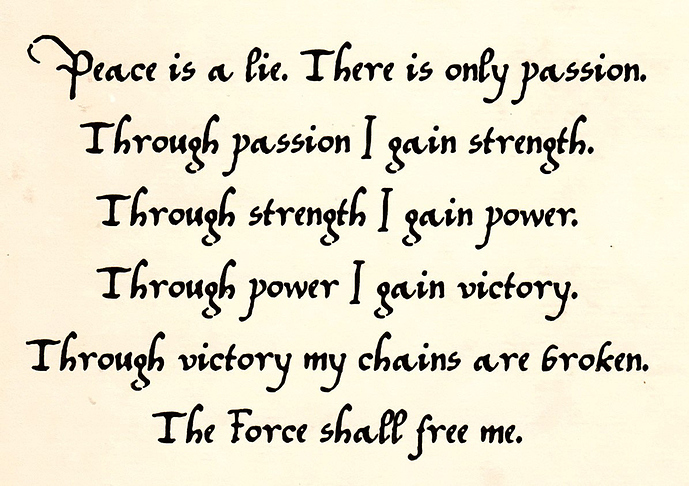Source: Code of the Sith | Wookieepedia | Fandom
OVERVIEW
The Code of the Sith was the mantra that reinforced the core beliefs of the Sith Order. It was considered the dark side counterpart to the Jedi Code. The code remained remarkably unchanged through the millennia.
THE SITH CODE
Peace is a lie, there is only passion.
Through passion, I gain strength.
Through strength, I gain power.
Through power, I gain victory.
Through victory, my chains are broken.
The Force shall free me.
ANALYSIS OF THE CODE
Some have speculated that the Code of the Sith was created in direct contrast with the Jedi Code, to illustrate the fundamental philosophical differences between the orders. This could certainly account for the first line of the Sith Code discounting the Jedi’s proclamation of peace, as well as the similar structure of the two Codes, although the Jedi claimed the Code spoke only of the Sith’s individual wants and desires.
Peace is a lie, there is only passion
The “peace” of the Jedi, meaning the lack of conflict, was an agent of stagnation. Conflict, however, was seen as the source of progress for both the single beings and the civilizations. The necessity of conflict was a law of the universe and not just a Sith thinking. Fundamentally, the Code of the Sith expressed their rejection of selflessness and their full embrace of passion and lust. Although some individuals turned to the dark side out of a philosophical ideal or even wished to wield its violent powers for altruistic purposes, all Sith ended up prisoners of their own crave for power. The deeper nature of the Sith Order was a predatory one.
Through passion, I gain strength.
The Sith saw themselves as seekers, challengers of old and stagnant ways, in touch with the laws of nature and the universe. They saw the Jedi as denying their natures and afraid of the truth around them. Passions were what kept all creatures—from the most rudimentary to the most evolved sentient—alive. They believed that mastery of their passions gave them strength the Jedi lacked.
Through strength, I gain power.
Without strife, the victory has no meaning. Without strife, one does not advance. Without strife, there is only stagnation.
Through power, I gain victory.
The Sith did not believe that victory by any means was desirable, but believed that unless victory proved your superiority, it was an illusion and temporary. Though there might be different types of victories—peaceful victory, victory by sacrifice, even a truce—Sith dogma taught that unless the victory was achieved by demonstrating that one’s power was superior, it was not true victory. The stronger a Sith became in the Force, the more power he could achieve, but he always had to fight for that power.
Through victory, my chains are broken.
The true meaning of the line “…my chains are broken” was a subject of argument among many Sith. The chains represented a being’s restrictions; not just a Sith but any being in the universe. The restrictions could be those placed upon a being by someone else, or restrictions that one placed upon oneself. The ultimate goal of any Sith was to free himself from such restrictions, but not in the simplistic meaning of just being able to do whatever he wanted. The Sith desired to free themselves in order to reach perfection and fulfill their potential. They wanted perfect strength, perfect power, and perfect destiny, which, in turn, allowed one to do whatever they wanted for the most part. The person who had these abilities was known as the Sith’ari.
The Sith’ari was supposed to destroy the Sith and then make them stronger than ever. This caused many Sith to treat perfection as a goal to work towards rather than a strict state of being, and in that way they were very like the Jedi.
The Force shall free me.
The Sith believed that those who strove for perfection through knowledge and mastery of the Force would be rewarded. The Sith also believed that those who followed their code were free of the mundane restrictions of others, that they strove for a greater purpose and thus threw off the restrictions normally placed upon individuals by society and other organizations.

